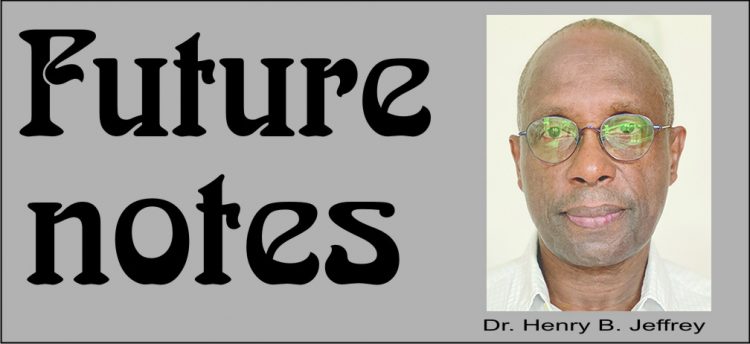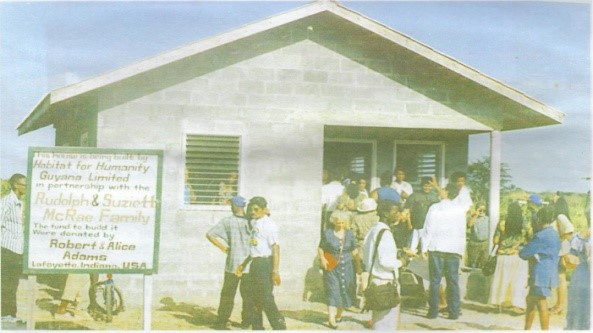
For many reasons, I have a soft spot for the Carter Center and was surprised when the government refused them access to monitor the ongoing recount of the 2nd March 2020 elections. For me, Jimmy Carter and his organisation have been long term friends who have shown more than a political/electoral interest in Guyana. In about 1994/5, when I was the Minister of Housing, I read in a magazine that President Carter had established Habitat for Humanity to aid in the provision of housing for low income persons by way of a self-help arrangement. Having as a child participated with my mother and step-father in such a group in Beterverwagting/Triumph Village and having grown up in the resulting house, this type of cooperation has remained attractive to me. Furthermore, in the early years of the 1992 PPP/C government, incomes were too low for the vast majority of families to be able to purchase they own homes in the usual manner. I asked President Cheddi Jagan to speak to Jimmy Carter, who was in Guyana at the time, with a view to establishing a local branch of the organisation. Jagan informed me that Carter required a request letter, I delivered one to him at the Pegasus Hotel where he was staying, and the rest is history.
Secondly, the Carter Center also proposed and then worked with Guyana in the development of the National Development Strategy in the hope that it would be some kind of a platform around which all stakeholders could unite. However, the PPP chose the path of ethnic dominance, which it sought to disguise by claiming political cooperation would be achieved when the elites of major parties learn to ‘trust’ each other! Thus in 2004, Carter left Guyana claiming: ‘Jagdeo is an intelligent and capable leader, but he takes full advantage of the ancient “winner take all” system in Guyana. Following my meeting with him, I was very doubtful that his political party (the PPP) would commence new dialogue with the PNC, be willing to make any substantive moves to implement the National Development Strategy, share political authority with other parties, or permit members of parliament to be elected by their own constituencies instead of being chosen from a party list on a proportional basis.’
Thirdly, the Center’s position on governance in Guyana, which has since been regularly stated in their comments, was very much in keeping with my view of the course political development in Guyana should take. The statement above maintains that tradition: ‘Regardless of the outcome of the election, the Center reiterates (the) view that Guyana’s winner-takes-all system needs to be reformed and encourages all parties to commit to national reconciliation and to completing key constitutional reforms in the near future’ (Ibid, 21/05/2020). Therefore, until the refusal of the coalition government to allow the Center to return for the recount of the 2nd March poll, I honestly believed that it could be a major broker in any rapprochement between the PPP and PNC.
The coronavirus excuse for not entertaining the Center is balderdash and the statement by the Center that by not accommodating it at the recount ‘the government of Guyana chose not to demonstrate a genuine commitment to transparency’ (Ibid, 21/05/2020) does not stray too far from this category. The presence of the Carter Center in no way guarantees that elections will not be manipulated. In the 2017 elections in Kenya, nine international monitoring teams including the Carter Center, the European Union (EU), the African Union (AU), and the Commonwealth commended the Kenyan electoral management body for the conduct of the elections that were later annulled by the Supreme Court.
Not unlike what we are hearing in Guyana at present, according to the Supreme Court, the elections authority did not have all the tally forms when they announced results and some forms lacked security features such as watermarks, signatures or serial numbers, which called their authenticity into question. ‘However, in defending its work in Kenya, the Carter Center, whose mission was led by former Secretary of State John Kerry, drew attention to its August 10th statement that ‘election day voting and counting processes had functioned smoothly but that the electronic transmission of results proved unreliable’(https://apnews.com/8e45990a7726444 caed45359c1f83d87). Substitute ‘pre-elections arrangements’ for ‘electronic transmission’ and there you have it!
As indicated above, integrity in voter registration is critical to free and fair elections, and it is well understood that elections are best manipulated long before elections day. Beginning some two years before the elections, a huge controversy over the electoral register started with the decision of the coalition to implement new house to house registration to clean what it claimed was a bloated list and the objections of the PPP to that process. The no-confidence vote, the lengthy legal battles, etc., were all related to this struggle. Given the international monitors’ deep knowledge of electoral processes and awareness of the electoral history of Guyana, they must have known that attempts would have been made to use the bloated electoral list.
Why, therefore, throughout the pre-election process did they not make more effort to ensure that this glaringly deficient is widely recognised and rectified? Why, even on the eve of elections, did the Carter Center’s pre-election assessment, while rightly alerting stakeholders to the tabulation process, neglect to draw attention to the possibility of fraudulent use of the bloated list? We are told in that document that: ‘The Carter Center has not reviewed all changes made to the voter register, it is satisfied that preparations have been made in a professional manner within the existing legal provisions. The Center hopes that all the work undertaken will ensure the utmost accuracy in the list to ensure a smooth polling day.’ Of course, best practice electoral principles and legal provisions are two different things and smooth polling on elections day is not nearly the most important reason the list should be accurate.
Secondly, the coalition intended the recount to be something of an audit and it might have noticed that it could be hamstrung by the Carter Center’s normal approach. As can be seen in its final report on the 2017 Kenyan elections, the Center appears to strongly hold to the international largely quantitative principle ‘that an annulment of elections should only be declared when the irregularities are shown to affect the outcome of the election.’ It appears to me that the yet to be entrenched principle that is more useful when dealing with illegal voting is the one that states that elections could be nullified ‘if the elections process was marred by irregularities which project the elections process as having been conducted in violation of the electoral rules’ (http://opiniojuris.org/). These two principles are not totally at odds and it will be interesting to see as the process continues how these and the laws of Guyana will be aligned by the Guyana Elections Commission to produce a just result.
